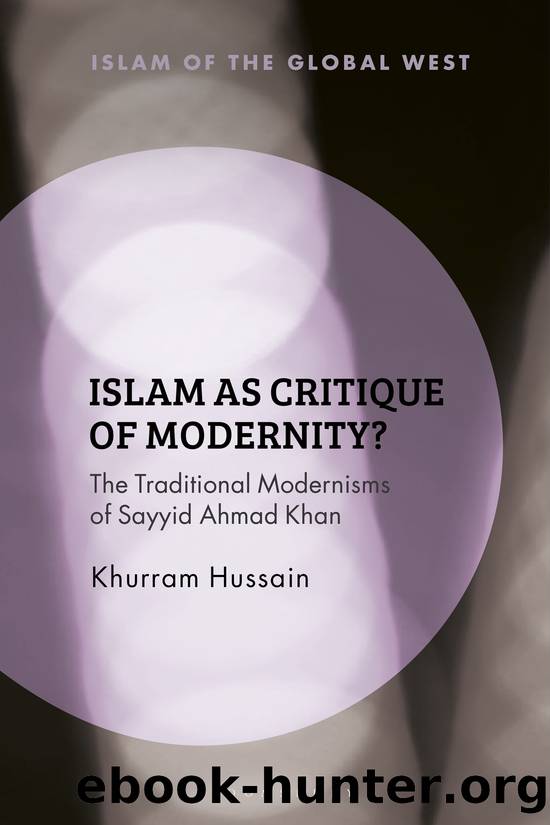Islam As Critique by Hussain Khurram;

Author:Hussain, Khurram;
Language: eng
Format: epub
ISBN: 9781350006348
Publisher: Bloomsbury UK
5
Knowledge and Wisdom
The evaluative infrastructure of Western modernity is defective because knowledge has become disaggregated from wisdom. What is knowledge? Knowledge is information that begets information. It is information that has become alive. What is wisdom? Wisdom is an artifact of knowledge.1 As knowledge accumulates, it sediments into layers of meaning that provide evaluative foundations for further accumulation. This is wisdom. In the beginning, information was merely instrumental to the needs of biological survival. Or at best it concerned the menial work of hunting and gathering, and such information did not yet have proper human value. A primordial accumulation of surplus information first produces the faint outlines of wisdom, of self-reflexive knowledge. This is information that has no good use, like drawings of animals on cave walls, or the first fleeting sense of compassion, or the feeling of elation when surrounded by others. This is something akin to âcollective effervescenceâ perhaps, an emergence of a communal evaluative sensibility, of something deemed sacred as opposed to merely useful.2 It is in the evaluative regime of such wisdom that information is no longer merely replicated from one generation to the next but reproduced in the sense of being directed through such reproduction. Knowledge both grows on the foundation of wisdom and constantly produces new wisdom as an artifact of such growth. When a certain kind of animal becomes self-consciously mimetic in its relationship to information, both knowledge and wisdom are co-produced. For to mimic is not to repeat, but to re-present the original. This is the beginning of proper human societies. If knowledge is brain matter, then wisdom is consciousness. And in this metaphor, tradition is narrative self-awareness. It is identity.
In modern societies, knowledge production has become unmoored from the direction of wisdom. Wisdom no longer properly sediments as a function of the growth of knowledge. This is the condition that Alasdair MacIntyre so plaintively describes in his landmark book After Virtue. What binds knowledge and wisdom together is tradition; a constantly evolving yet coherent narrative of the norms of collective identity and its attendant cosmologies. MacIntyre believes that the origins of Western modernity lie in what he calls a âmoral calamity.â3 This was the calamitous breakdown of a tradition of moral thinking that had earlier provided a philosophical mechanism for imagining societies as coherent and meaningful wholes. With the loss of this tradition, incoherence enters our moral thinking and societies become fragmented into mere collections of aggregated individuals and of free-floating spheres of judgment. What was this tradition? MacIntyre describes it as a system of norms, signs, and symbols based on a broad Aristotelian normative sensibility, though in After Virtue he does not yet lay out in detail the goods associated with the particular form of Aristotelianism he himself identifies with (this task is undertaken in his next book Whose Justice? Which Rationality?). The moral calamity was the slow unraveling of this culture and the tradition of moral thought associated with it. Modernity is the fruits of this unraveling. In After
Download
This site does not store any files on its server. We only index and link to content provided by other sites. Please contact the content providers to delete copyright contents if any and email us, we'll remove relevant links or contents immediately.
| Hadith | History |
| Law | Mecca |
| Muhammed | Quran |
| Rituals & Practice | Shi'ism |
| Sufism | Sunnism |
| Theology | Women in Islam |
The History of Jihad: From Muhammad to ISIS by Spencer Robert(2629)
Nine Parts of Desire by Geraldine Brooks(2369)
The Turkish Psychedelic Explosion by Daniel Spicer(2358)
The First Muslim The Story of Muhammad by Lesley Hazleton(2273)
The Essential Rumi by Coleman Barks(2048)
1453 by Roger Crowley(2031)
The Last Mughal by William Dalrymple(1858)
Trickster Travels: A Sixteenth-Century Muslim Between Worlds by Davis Natalie Zemon(1848)
Muhammad: His Life Based on the Earliest Sources by Martin Lings(1649)
God by Aslan Reza(1644)
by Christianity & Islam(1636)
A Concise History of Sunnis and Shi'is by John McHugo(1569)
No God But God by Reza Aslan(1545)
Magic and Divination in Early Islam by Emilie Savage-Smith;(1534)
The Flight of the Intellectuals by Berman Paul(1503)
Nothing to Envy by Barbara Demick(1450)
Art of Betrayal by Gordon Corera(1431)
What the Qur'an Meant by Garry Wills(1395)
Getting Jesus Right: How Muslims Get Jesus and Islam Wrong by James A Beverley & Craig A Evans(1343)
